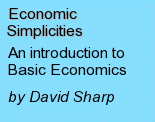




INTRODUCTION TO
ECONOMICS
Lesson 3 of 2006
ECONOMICS OF
CORRUPTION
The current inquiry
into the activities of the Australian Wheat Board has, inter alia,
raised questions, in an economic context, as to the meaning and
significance of corruption.
What is Corruption?
What is corruption
? is a question more easily formulated than answered.
One common definition is “ “the use of public office for
private gain”. This is
relatively simple but it raises questions; is corruption then something,
which only occurs, in the public sector?
Can, for instance, a bureaucrat in a large company or other
private organisation be corrupt, or just dishonest?
Or a headwaiter at a popular restaurant who for a sizeable tip
will let you jump the queue for a table.
Dissatisfaction
with the restriction of the use of the word corruption to refer only to
the public sector has lead to another common definition; “the use of a
position of trust for dishonest gain”.
Whilst wider than the first, this definition also raises
questions; to whose trust does it refer and what is dishonest.
Is the headwaiter in the above example corrupt, given that the
public generally knows of the practice and the owners condone it.
The concept of
corruption requires at least some precision when it is criminalised,
particularly if such criminal laws are then sought to be enforced.
One place where this has occurred is Hong Kong, which has set up
an Independent Commission Against Corruption [ICAC]. Its website offers the following definition;
“In simple terms,
corruption occurs when an individual abuses his authority for personal
gain at the expense of other people.
Corruption brings unfairness, crookedness and, in more serious
cases, puts the lives and properties of the community at stake.
The spirit of the Prevention of Bribery Ordinance [POBO] enforced
by the ICAC is to maintain a fair and just society.
The law protects the interests of institutions and employers and
inflicts punishments on unscrupulous and corrupt staff.
POBO oversees corrupt offences in both the public and the private
sector.”
The concept of
corruption can be considered from many aspects; moral, cultural, legal,
philosophical political and so forth.
Some areas of consideration are whether corruption is efficient
as a means of achieving a desired result, whether corruption leads to
any and if so what distortions of the marketplace, what are the negative
and positive impacts of corruption on an economy and whether ultimately
an economy is likely to achieve greater production and growth or less if
it were to seek to reduce or even eliminate it.
These are questions of economics.
One reason often
advanced, explicitly or implicitly, for proscribing corruption [or
various particular practices identified as corrupt] is that allegedly it
or they are inefficient and impose an overall cost on the community.
Refuting or confirming such allegations is a task for economists.
In a narrow sense they can try to do so by isolating and
addressing those aspects traditionally considered ‘economic’.
In a wider sense they can try to do so by evaluating the entire
concept.
Some Arguments
Against Corruption
·
It reduces respect for
government
·
It reduces the effect of
government regulation and impedes the achieving of government aims.
·
It distorts the market
process.. Thus for instance
competitive tendering is rendered nugatory if the person responsible for
making the decision to purchase does so on the basis of a
‘kickback’.
·
It reduces respect for,
and value of, brands and institutions, and of their product.
Thus for example a university, which permitted its degrees to be
purchased, would lose reputation and would also diminish the esteem of
all previous graduates holding that degree.
·
It adds to the cost of
doing business and to the cost of existence generally
Some Arguments
For Corruption
·
It reduces or eliminates
some of the effect of bad laws or bad government.
·
It reduces the effect of
government regulation and impedes the achieving of government aims.
David Sharp